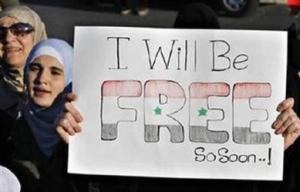 Beirut, Lebanon -Syrian security forces cracking down on opposition strongholds in Latakia herded thousands of people into a stadium and took away their identification cards and cellphones, activists said Monday.
Beirut, Lebanon -Syrian security forces cracking down on opposition strongholds in Latakia herded thousands of people into a stadium and took away their identification cards and cellphones, activists said Monday.
Forces loyal to the regime of President Bashar Assad continued hammering opposition strongholds in the country’s main port city, especially in the district of Ramleh, which has been pummeled with tank, gunboat and automatic weapons fire after unusually large antigovernment demonstrations broke out there Friday.
Security forces began ordering residents of the area, which includes a refugee camp housing more than 10,000 Palestinians, to go to a soccer stadium ahead of what they described as a huge military operation, activists said. At least five people were confirmed dead.
“They were told they should leave their homes and go to stadiums because the armed forces were going to flatten the area,” said an activist in the city, who asked that his name not be used. “Cellphone networks were cut as thousands of people left their houses and flocked toward the stadium. As they were gathered and directed to the stadium, their IDs were confiscated.”
The latest developments are sure to heighten international concern over Syria. The United Nations agency responsible for overseeing Palestinian refugee camps in the Middle East said Monday that it was “gravely concerned” about the situation in Latakia and demanded unhindered access to the facility.
“The situation is very bad,” Christopher Gunness, spokesman for the U.N. Relief and Works Agency, said in a phone interview. “There are more than 10,000 residents of the camp, and half of them left out of fear of incoming fire from the land and sea. We don’t know where they are, and we’re the ones responsible for them. We’re just desperately trying to find out where everyone is.”
Meanwhile, Turkish Foreign Minister Ahmet Davutoglu sharpened his rhetoric against Syria after visiting Damascus, the capital, last Tuesday and extracting a promise to ease military operations and enact reforms.
“This is our final word to the Syrian authorities: Our first expectation is that these operations stop immediately and unconditionally,” Davutoglu told reporters, according to Reuters. “If these operations do not stop, there will be nothing left to say about the steps that would be taken,” he said, without specifying what Turkey would do.
Other foreign leaders have also called for the Syrian government to stop the violence against its people.
Jordanian Prime Minister Marouf Bakhit on Monday reportedly urged his Syrian counterpart, Adel Safar, to immediately halt military operations, implement speedy reform and spare the blood of the Syrian people. Palestine Liberation Organization Secretary-General Yasser Abed Rabbo denounced the violence, saying it was “part of the crimes against humanity” targeting Palestinians and Syrians alike.
In Washington, U.S. officials said they had found no evidence to substantiate widely published reports that Syria’s artillery barrage on Latakia on Sunday came from naval warships. U.S. officials had confirmed that the Syrian government had tanks in the city “and that there is firing on innocents again, in the pattern of carnage that you have seen in other places. So we are concerned,” said Victoria Nuland, the chief State Department spokeswoman.
Video posted to the Internet and said to be from Latakia on Sunday showed tanks and armored vehicles along the city’s southeastern district, with the rattle of automatic weapons fire audible in the background.
In attempting to halt a massive campaign of civil disobedience, Syrian security forces previously rounded up residents in soccer stadiums in Dara, where the five-month uprising against Assad’s rule began, and the coastal city of Baniyas. According to Human Rights Watch, the New York-based advocacy group, witnesses described at least some executions of prisoners inside the Dara stadium.
“It’s a continuation of a deliberate policy of the military crushing the protest movement,” said Nadim Houry, Human Rights Watch’s senior researcher for the Middle East and North Africa. “We’ve seen it now in so many cities.”
Some predicted the authorities would attempt to use those rounded up in the stadium as political pawns.
“Maybe they want to show them as the armed gangs,” said one activist, who gave her name as Zoya. “Or they want to gather them and force them to go out in a demonstration that supports Bashar Assad.”
Another activist said the stadium maneuver foreshadowed further targeting of the Ramleh neighborhood, the site of ever-larger daily antigovernment demonstrations.
“They are telling people right now to go out of the region,” said Wael, a 23-year-old medical student in Latakia. “Everyone who stays will be considered an armed resister, and they will kill him.”
By Borzou Daragahi and Roula Hajjar,
LAT

Leave a Reply
You must be logged in to post a comment.